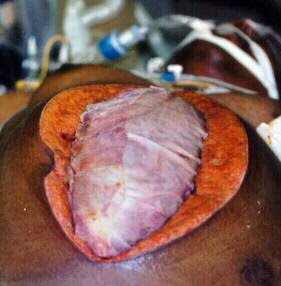
I always think abdominal compartment syndrome in an interesting phenomenon. We haven't had a case of it for a very long time, and it seems to be pretty rare from my experience, but still interesting. What made me think of it was a recent patient that thought he had compartment syndrome of his leg. Although compartment syndrome is well recognized in the extremities, this guy DID NOT have it. I'm not sure if someone told he has or may get it when he first came in, but his leg was a soft as could be. Nonetheless, he got me thinking about it and how it can also occur in the abdomen.
Compartment syndrome occurs when there is increased pressure within a fixed compartment that is usually limited by bone and/or fascia. In the abdomen, the result of this is organ dysfunction, such as decreased urine output from decreased renal perfusion or respiratory distress from decreased tidal volumes. It may seem a little strange to think of the abdomen as a fixed compartment. An extremity presents a clearer picture because its ability to distend is pretty limited. But even the abdomen will reach an endpoint in its ability to distend, as the picture above shows.
The abdomen can be at risk for compartment syndrome in an acute setting from an internal source such as intraperitoneal hemorrhage, an external factor that limits the belly from distending such as debris or structures crushing the patient, or even large volume resuscitation. An example of a chronic cause would be ascites from cirrhosis.
The key to resolving the sequela is to remove the pressure. This can be done by removing the external source or draining the internal source. Although patients with chronic ascites often undergo paracentesis (get "tapped"), this is probably not the best solution for someone who came in as a trauma patient. Most likely there is extensive internal bleeding, and merely draining the blood will not solve the problem. This would be a clear indication for going to the OR for an ex-lap to find the source of bleeding and repair it. But if there's that much blood, in some ways the pressure may be tamponading the source. In which case, once the belly opens, surgery could be quite tenuous and possibly a time when a patient "bleeds out."




No comments:
Post a Comment